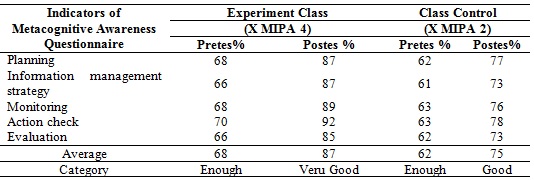
Improving Students Metacognitive Abilities Through Mind Mapping with Problem based Learning Learning Models on the Concept of Environmental Pollution at SMAN 7 Pekanbaru
Abstract
Keywords
Full Text:
PDFReferences
Bahri, A. (2010). Pengaruh Strategi Pembelajaran Reading Questioning and Answering (RQA) pada Perkuliahan Fisiologi Hewan terhadap Kesadaran metakognitif, keterampilan metakognitif, dan hasil belajar kognitif mahasiswa jurusan biologi FMIPA UNM. Tesis. Malang: PPS Negeri Malang.
Buzan, T. (2006). Buku Pintar Mind Mapping. Terjemahan Susi Purwoko. Jakarta: PT.Gramedia Pustaka Utama.
Chintani, S., Deswidya, S, H., & Salim, E. (2018). Pengaruh Model Problem Basic Learning Dengan Teknik Mind Mapping Terhadap Kemampuan Berpikir Kritis dan Pengetahuan Metakogitif Siswa Sekolah Menengah Pertama. Jurnal Pendidikan Biologi. 8 (1), 1-5.
Cooper, S. (2004). Metacognition in the Adult Learner. Diakses 28 Mart 2017 dari http://.www.wsu.Metacognition and Its Instrument.htm.
Farrand, P., Fearzana, H., & Hennessy, E. (2002). The Efficacy of the Mind Map Study Technique. Medical Educatio, 36, 426 – 43.
Firdaus, W. (2010). Uji coba metode mind mapping untuk meningkatkan kemampuan membaca sekilas (skimming). Jurnal UPI dan UPSI Bandung, 4(2), 356-365.
Goodnough, K., & Cashion, M. (2003). Fostering Inquiry through Problem-Based Learning. The Science Teacher, 70(6), 21- 25.
Hadi., & Nurul, A. (2009). Pengaruh Penerapan Strategi Pembelajaran Problem Based Learning (PBL) terhadap Keterampilan Metakognitif dan Pemahaman Konsep Siswa Kelas X di SMA Negeri 8 Malang pada Kemampuan Akademik Berbeda. Skripsi Tidak Diterbitkan. Malang: FMIPA Universitas Negeri Malang.
Hilman. (2014). Pengaruh Pembelajaran Inkuiri Terbimbing dengan Mind Map terhadap Keterampilan Proses Sains dan Hasil Belajar IPA. Jurnal Pendidikan Sains, 2 (4), 221-22.
Lai., & E, R. (2011). Metacognition: Literature Review. Diakses tanggal 18 September 2017 dari http://www.pearson assesments.com/research
Lufri., Fitria, L., & Azwir, A. (2020). Effect of Active Learning in Form of Scientific Approach with Assistance of Student Worksheets Based Problem Based Learning (PBL) Towards Students Biology Psychomotor Competence in Bacterial Material. Journal of Educational Sciences. 4 (1), 20-29.
Marshall, M. (2003). Metacognition. Thinking about Think-ing is Essential for Learning.diakses 27 Januari 2017 dari http://teach-ers.net/gazette/June03/marshallprint.html
Merina, P. (2019). Student Tutoring, Facilitator and Explaining Models: A Problem Solving Metacognition towards Learning Achievements of Informatic Students. Journal of Educational Sciences. 3 (2), 145-154.
Nur, A., Yenita, R., & Atma, M. (2020). Development of Learning Tools by Application of Problem Based Learning Models to Improve Mathematical Communication Capabilities of Sequence and Series Materials. Journal of Educational Sciences. 4 (1), 62-72.
Paidi. (2008). Pengembangan Perangkat Pembelajaran Biologi yang Mengimplementasikan PBL dan Strategi Metakognitif serta Keefektivitasnya terhadap Kemampuan Metakognitif, Pemecahan Masalah, dan Penguasaan Konsep Biologi Siswa SMA di Sleman Yogyakarta. Disertasi. Malang.
Patonah, S. (2014). Elemen Bernalar Tujuan pada Pembelajaran IPA Melalui pendekatan Metakognitif Siswa SMP. Jurnal Pendidikan IPA Indonesia, 3(2), 128-133.
Petters, E. (2000). Connecting Inquiry to The Nature of Science as a metacognitive Resource. Science Education, 10(5), 101-104.
Schraw., & G, Dennison, S. (1994). Assessing Metacognitive Awarness. Contempory Educational Psychology, 19, 460-475. http://wiki.biologyscholars.org/@api/deki/file/99/=schraw 1994.pdf.
Slameto. (2010). Belajar dan Faktor-Faktor Yang Mempengaruhi. Edisi Revisi. Bandung: Rhineka Cipta.
Suastra. (2013). Pengaruh Model Pembelajaran Berbasis Masalah terhadap Sikap Ilmiah dan Keterampilan Berpikir Kritis. Journal Program Pascasarjana Universitas Pendidikan Ganesha, (3), 1-10.
Sudiarta, P. (2006). Penerapan Strategi Pembelajaran Berorientasi Pemecahan Masalah dengan Pendekatan Metakognitif Untuk Meningkatkan Pemahaman Konsep dan Hasil Belajar Mahasiswa. Jurnal Pendidikan dan Pengajaran. (3), 588-602.
Sugiyono. (2014). Penelitian Pendidikan. AlfaBeta
Suherman. (2001). Strategi Pembelajaran Matematika Kontemporer. Bandung. UPI. Diakses Unduh 30 juli 2018 dari file.upi.edu.
Tan, O, S. (2009). Problem Based Learning. Singapore: Cengage Learning.
Tanriseven, I. (2014). A Tool that Can be Effective in the Self-Regulated Learning of Pre-Service Teachers: The Mind Map. Australian Journal of Teacher Education, 39(1).
Ulfa, W., & Wasis. (2015). Penerapan Strategi Mind mapping Untuk Meningkatkan Keterampilan Metakognitif Siswa Pada Materi Alat-Alat Optik Kelas X SMA Negeri 1 Krembung. Jurnal Inovasi Pendidikan Fisika (JIPF), 4(2).
Wibowo, Y. (2008). Pengaruh Strategi Diagram Roundhouse Terhadap Kemampuan Kognitif Siswa SMA Kelas XI IPA SMA Laboratorium UM. Skripsi. Malang : FMIPA UM.
DOI: http://dx.doi.org/10.31258/jes.4.2.p.380-391
Refbacks
- There are currently no refbacks.
Copyright (c) 2020 Rika Mulyani, Sri Wulandari, Imam Mahadi

This work is licensed under a Creative Commons Attribution 4.0 International License.
Publisher: FKIP Universitas Riau












